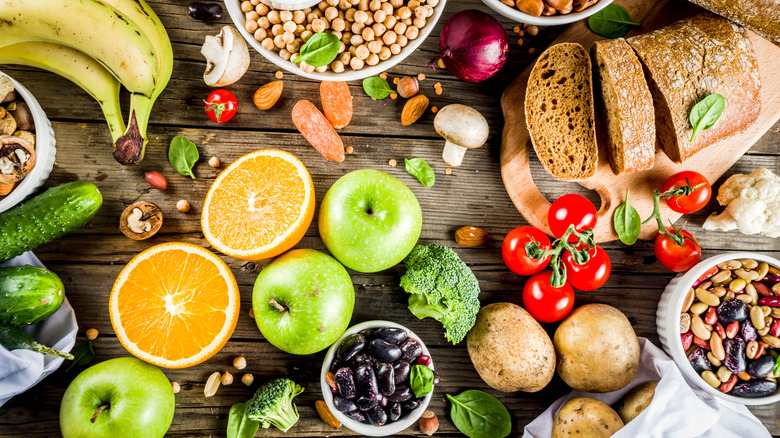The Best Time To Eat Carbohydrates If You're 50 Or Older
If you're over 50, it's critical to keep an eye on your blood sugar. You're more likely to develop type 2 diabetes when you get older because your body becomes more insulin resistant and your pancreas (which produces insulin) becomes less efficient. When you eat a lot of carbs, your body secretes insulin to lower your blood sugar. If you shock your body with too many carbs and your body doesn't use insulin effectively, that blood sugar (glucose) gets stored as fat.
One way to manage your blood sugar is to eat carbohydrates last in your meal, according to a 2017 article in BMJ Open Diabetes Research and Care. One condition had people consume ciabatta bread and a glass of orange juice first, then wait 10 minutes before eating a grilled chicken breast and a salad. Another condition had them eat all of the food at once. The third condition had people consume the orange juice and bread 10 minutes after the chicken and salad. When they ate the carbs last, their blood sugar levels were about 53% lower than if they had them first. They also had lower insulin levels in their bodies.
Consider the time of day you eat your carbs
Along with eating your carbs towards the end of each meal, you'll also want to eat your meals earlier in the day. A 2023 article (via Nutrients) looked at how the time of day can affect your blood sugar. People who started eating earlier in the day had lower glucose levels and lower insulin resistance.
Your last meal of the day can also make a difference, not only in your glucose levels but also in how you metabolize fat, according to a 2021 study in Nutrients. When people ate dinner at 6 p.m., they had better average glucose levels than if they had dinner at 9 p.m. Their bodies also burned more fat after breakfast when they ate an earlier dinner the day before.
Many diet fads advocate restricting carbohydrates to lower glucose levels and reduce body fat. That's not the best practice for older adults. Healthy carbs are especially important for older adults because they provide fiber to keep your digestive system healthy. Older adults also need slower-digesting complex carbs to provide energy.
Choose carbs that don't spike your blood sugar
A piece of white bread and a glass of orange juice might be part of a healthy breakfast, but they both can quickly spike your blood sugar due to their high glycemic index. Fruit juice lacks the fiber that typically slows down digestion and blood sugar spikes. To help manage your blood sugar as you age, opt for whole fruit. White bread tends to have half the fiber of whole wheat bread, so it's better to choose bread made with whole grains and fiber to manage your blood sugar.
Choosing foods that have a lower glycemic load can lower your risk of developing type 2 diabetes, according to a 2019 article in Nutrition. Glycemic load (GL) considers the amount of carbohydrates in a typical serving of food that can impact your blood sugar. For example, a small baked potato has a higher glycemic load than an apple. The study found that men who ate the most foods with a high GL had a 26% higher risk of developing type 2 diabetes than those who ate lower amounts.


